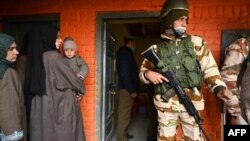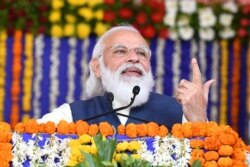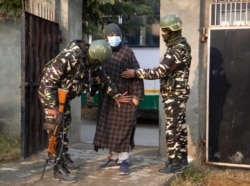Journalists covering the first district elections to take place in Indian-controlled Kashmir since the government revoked the region’s special status last year say they are being harassed and obstructed from reporting.
Media in the region were already facing challenges, including regulations imposed during the COVID-19 lockdown, limited internet access, restrictive new media laws, and arrests and harassment that have ramped up since India removed Article 370 from the constitution in August 2019, which granted autonomy to Jammu and Kashmir, India’s Muslim majority state.
But journalists say covering the District Development Councils and Panchayat by-elections have been particularly tough, with at least three assaulted while reporting on alleged obstruction at polls; pressure placed on the media to not report critically; and a high-speed internet ban that will remain in effect until December 25. Results for the elections are expected December 22.
Held in eight phases, the district election is seen as a verdict on Prime Minister Narendra Modi’s government revoking Article 370 and also 35A, which gave Jammu and Kashmir power to grant rights to permanent residents of the states. At the time, Modi said Pakistan had used the special status “as a weapon to incite people of the region against India.”
Kashmir is claimed in full by India and Pakistan. India’s portion has been hit by separatist violence since the late 1980s. A win for the ruling Bharatiya Janata Party (BJP) would signal that Kashmiris have voted to accept the removal of Article 370.
In August, six political parties came together to form The People's Alliance for Gupkar Declaration (PAGD), with a platform to restore the special status of the region.
Waheed-ur-Rehman Para, a candidate from the alliance, was detained on November 25 for alleged links to the separatist group Hizbul Mujahideen. And Omar Abdullah, former chief minister of Jammu and Kashmir, has accused the Indian government of “enforcing a poll boycott and stopping people from casting their votes.”
“The entire machinery of the administration has taken upon itself the responsibility of helping the BJP in the DDC polls,” Abdullah said on Twitter.
The former chief minister was detained for nearly a year when India revoked the region’s status.
India’s directorate of information and public relations did not respond to VOA’s email requesting comment. The chief electoral officer for Jammu, Kashmir and Ladakh did not respond to an email request for comment.
Coverage blocked
Journalists covering the vote say they have been blocked from entering polling booths, despite having the necessary Indian government-issued accreditation, and that officials boycott reporters over critical coverage.
Mudasir Qadri, a stringer with News 18 Urdu, said security blocked him while he was reporting on the second phase of the district elections in Chattergul, South Kashmir, despite showing them the pass issued by the election commission.
Owais Farooqi, a journalist from Bandipora, told VOA that the media cannot afford to upset security forces or voters by asking uncomfortable questions.
“Situations overturn anytime here. Sticking together with the group and avoiding any confrontation remains a priority. Now, when voting is happening around sensitive areas, this strategy helps,” he said.
Khalid Gul, a senior journalist from South Kashmir, added that intimidation of journalists is at its peak.
“If you are not their (government’s) favorite, they don't respond to your calls for an official quote,” Gul said. “(If) we report the way they don't want us, then the administration boycotts us. We may need their quotes or some other information for another story, but they refuse to cooperate.”
In one incident, a police chief slapped three journalists who had been reporting on claims that residents were being prevented from voting.
Fayaz Lolu, a stringer with ETV; Qadri, from News-18 Urdu; and Junaid Rafiq, who contributes to TV-9 were interviewing locals on December 10 who alleged officials were not allowing people to vote in the Srigufwara area of Anantnag, the south district of Kashmir.
“After we took the (news) bites from the concerned people and other stakeholders, the police party told us to wait for the SSP Choudhry,” Lolu said, referring to Anantnag’s senior superintendent of police, Sandeep Choudhry. “The moment he stepped out of his vehicle, he straightway slapped me hard without even sharing a word.”
Lolu said when his colleague Qadri asked the superintendent why he had slapped Lolu, the police chief “took hold of Qadri and slapped him, as well.”
All three journalists said they were slapped and that police took their cameras and phones and detained them at the Srigufwara police station.
Rafiq was later taken to a hospital after experiencing breathlessness and falling to the floor while at the station.
“I was put on oxygen support and after some time, I felt OK,” he said.
News of the incident quickly spread, and police released them. Choudhry later apologized directly to them.
Dilbagh Singh, director general of Jammu and Kashmir police, did not respond to VOA’s email requesting comment.
The Kashmir Press Club and Kashmir Editors Guild condemned the treatment of the journalists and called for police to take action to end any abuse of authority. The Kashmir Press Club additionally urged the chief electoral officer to take note of the incident.






